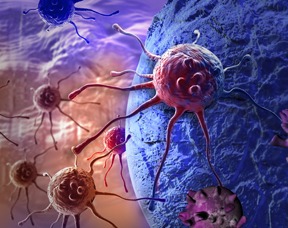A team of researchers at the University of Virginia School of Medicine have discovered a connection between two common prostate cancer treatments may soon make it possible to easily destroy prostate cancer cells. The drugs that could potentially benefit from this discovery are already in development and clinical trials to determine whether the new findings can improve treatments for prostate cancer patients might only be a few years away. Researchers at the university discovered the link between common treatments for prostate cancer radiation and androgen ablation which is treatment designed to suppress or block the production of male hormones. This discovery may allow doctors to better determine which forms of treatment will most benefit individual patients.
Researchers found that a cellular signaling pathway that is activated in response to radiation may also control cells’ sensitivity to androgen, which is the male hormone that is required by prostate cancer cells for growth. Androgen and androgen sensitivity can affect how susceptible prostate cancer cells are to the radiation treatment used to destroy them. UVA researcher Dan Gioeli, PhD, of the Department of Microbiology, Immunology and Cancer Biology and the UVA Cancer Center said,
“Now we have a novel link between two different standards of care for advanced prostate cancer. For locally advanced prostate cancer, radiation therapy is one of the standards of care, and that induces DNA damage, which would activate this pathway. Another standard of care for metastatic prostate cancer is androgen ablation, and that acts to inhibit androgen receptor activity. Now we have a new molecular understanding of how those two different standards of care might be connected.”
With this new information, doctors may be able to manipulate the signaling pathway, called “Checkpoint Kinase 2”. This is achieved by blocking the signaling process which would make it easier to destroy prostate cancer cells. Pharmaceutical companies already have drugs in development designed to inhibit CHK kinases. Dr. Gioeli is hopeful that this will help to speed up the clinical trial testing that could potentially lead to improved prostate cancer treatments. Dr. Gioeli also stated,
“The next steps are to see whether our predictions about … targeting this pathway could enhance cancer-killing in response to radiation or androgen ablation. Perhaps it would lead to a three-way combination where we would be looking at how androgen withdrawal sensitizes tumor cells to radiation therapy and whether we can further enhance that sensitization by inhibiting this pathway.”
For more information, their research was published online in the journal of Cancer Research.


